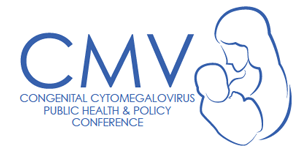Information about Cytomegalovirus (CMV)

Overview of CMV
Cytomegalovirus (CMV) is the most common cause of congenital defects in babies in developed countries. Pregnant women who contract CMV can pass the virus onto their unborn baby, which can result in multiple disabilities including: hearing loss, vision loss, small head size, lack of coordination, and seizures.
Why Should You Care?
CMV is the most common congenital infection, infecting one in 150 infants, or approximately 2,500 babies in the world each day. 1 in 5 of those babies, or 500 each day, will have permanent disabilities or die due to the virus. Congenital CMV causes more long-term problems and childhood deaths than Down Syndrome, Fetal Alcohol Syndrome, and neural tube defects.
However, only 13% of women know about CMV.
CMV Public Health and Policy Efforts in the United States
Recognizing the lack of awareness about congenital cytomegalovirus (CMV) and its potential devastating, long-term affects on babies, state lawmakers in the United States have passed legislation requiring public awareness initiatives and education programs and/or testing of newborns for CMV who fail the newborn hearing screening. Five states have legislation as of December 2015: Connecticut, Hawaii, Illinois, Texas and Utah. Additional states have proposed and are pursuing similar legislation.
Texas lawmakers built on the success of previous states by passing a bill that directs the Texas Department of State Health Services (TDSH) to establish a public education program to raise awareness of CMV and ways to prevent its spread. As part of the education effort, TDSH, public health advocates, parents whose children are affected by CMV, and healthcare providers came together to share ideas of how to get the CMV message out to women who are pregnant or may become pregnant. As CMV is the most common cause of congenital defects (e.g., vision loss, hearing loss, lack of coordination, seizures), it is imperative that individuals that work with babies, children, and women understand how the virus is spread, how to prevent infection, and early intervention efforts.
CMV Resources
Congenital CMV 101: from Prevention to Treatment, a webinar by Dr. Michael Cannon, CDC Epidemiologist
Congenital CMV Non-Profit Organizations
- AntiCito Onlus (Italy)
- Chanter Marcher Vivre (France)
- Congenital CMV Association (Australia)
- CMV Action (United Kingdom)
- National CMV Foundation (United States)
- Stop Citomegalovirus (Spain)
